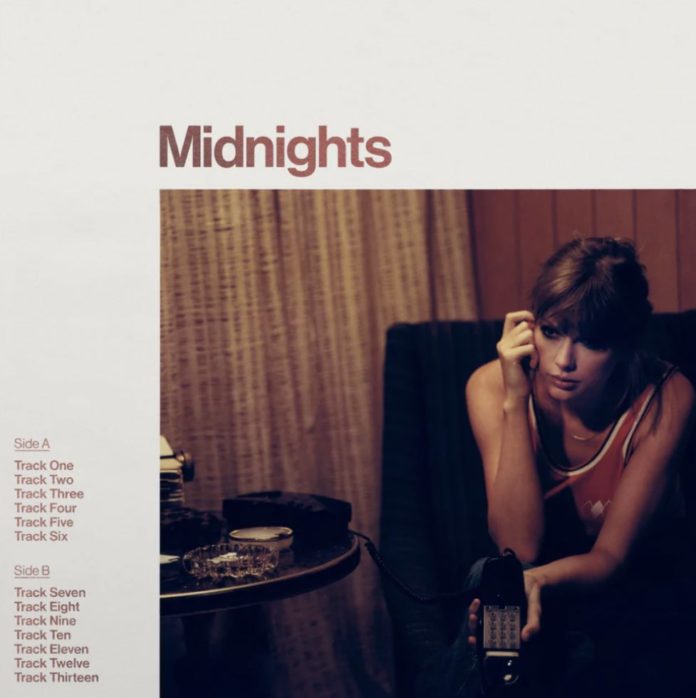
By Mallory Harris | Guest Contributor
Taylor Swift needs no introduction and definitely does not need me to promote or defend her music in any way, but I’m going to do it. While I’m fine with someone not enjoying her music, I can’t stand by and watch someone call it something it isn’t.
First, there is a fine line between a conceptual album and a visually conceptual album.
For example, Swift’s “Red” album was a conceptual album containing fall themes and love, with each song representing a shade of red. It isn’t considered a visually conceptual album because when released, Swift didn’t create outlandish visuals that went along with or depicted themes of her work.
On the other hand, “Midnights” is a visually conceptual album because of what Swift has released visually to depict themes of the album that aren’t quite as apparent in the songs.
It is important to note that the concept of the album is to share about 13 sleepless nights, and the music is focused on themes of shame, guilt, love, revenge and self-reflection. For example, there are four vinyls that each have a different colored disc and photo cover; when put together, they form a clock, clearly showing the idea of midnight as a timeframe.
Another aspect of these visuals can be seen in upcoming music videos Swift is calling “Midnight Music Movies,” in which she will go further into the concept that midnight is a time full of whimsical, curious and imaginative moments.
In the music industry, every artist has most likely written about love, revenge, friendship, grief and other deep emotions, but it once again seems that we only notice it when Swift does it. In this pure pop album Swift produced with Jack Antonoff, the sound is unique to Swift’s sound, but in the grand scheme of pop music, one could say there are similar sounds.
It’s understandable to say that each song sounds similar to one another. However, while each song can vary in tempo and beat, that’s only one aspect of an album. I hate to say to look at the entire album, but if all you look at are sounds and beats, then I agree that it all starts to sound the same. What makes an album great and exciting is its lyrics, which Swift is known for.
I’ll take a quick moment to nerd out and explain some musical and lyrical choices Swift made that make “Midnights” her better pop album. To ensure we can see each theme present in the original 13 songs, I’ll quickly give a summary of each track. Starting off with “Lavender Haze,” Swift is in the honeymoon stage of love. “Maroon” is a more sophisticated version of “Red (Taylor’s Version),” explaining how the relationship got to that point. “Anti-Hero” talks about being the problem for everyone else. In “Snow On The Beach,” Swift explains a cataclysmic display of watching two people fall in love. “You’re On Your Own, Kid” goes back through Swift’s entire career and how she’s gotten to this point. “Midnight Rain” once again expresses how a person just isn’t right for the other. “Question…?” asks questions about a relationship that ended years ago without closure. “Vigilante Shit” tells the story of getting back at someone through revenge. “Bejeweled” reminds us all to shimmer in our own way. “Labyrinth” shares the fear of falling in love. “Karma” reintroduces the idea of revenge and how it’s done great things for Swift. “Sweet Nothing” is her love song to her lover, co-written by him. Lastly, “Mastermind” explains how much of a planner Swift truly is in her own nature.
At least for me, it’s hard to see how Swift relies on themes of vengefulness in this album when only two of the original 13 tracks really showcase those emotions.
Ever since 2016, when Swift was involved with the Kimye drama, it’s clear that her usage of revenge as a muse has escalated. However, if you look at Swift’s entire discography, she has a “girlboss anthem” on each record, so why stop encouraging it now? It’s also significant to distinguish the context behind each anthem to understand how each one has a twinge of revenge, but some are factual in their moodiness while others aren’t. For example “mad woman,” “no body, no crime” and “Vigilante Shit” are stories about revenge based in theory. Conversely, “The Man,” “I Did Something Bad” and “Better Than Revenge” are based on real emotions and personal experience to display Swift’s feelings of vengefulness. Emotion is just another tactic most artists use to write songs and entertain their fans.
Yes, Swift worked with David O. Russell on a film that was recently released knowing the reports that came out about his past abuse. While Russell has a history of abuse on film sets, that doesn’t affect Swift’s ability to stand up against that topic. In 2017, Swift won a sexual assault case against a DJ who had groped her in 2013, and she received only $1, as she knew the case was more about the impact than about money.
It’s hard to see someone dismiss an album because of who Swift worked with once when she has made where she stands clear on the platform.
Again, it’s hard to hear someone call an album boring because they either didn’t understand what the album stood for or are sick and tired of a specific emotion.
Swift made it clear that this album was chock-full of raw emotion and deep, introspective thoughts that she’s experienced. Swift has gone through her revenge-seeking era and her falling-in-love era, but this new album allows her to get deep into who she is.
“Midnights” follows the pattern that most Swifties enjoy listening to, and that’s why it has broken records. Make sure that when you dislike her album (which is allowed), it’s because of the music and lyrics — not because you don’t like Taylor Swift.





